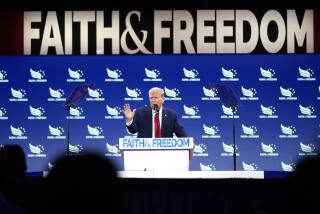Liberals Vie With Right for Votes of Christians : Politics: Major effort is planned to persuade churchgoers to follow their own faith, not that of high-profile conservatives.
Is the Christian Coalition’s political agenda really Christian?
Christian social liberals plan to launch a major effort to persuade churchgoers that their faith may call upon them to vote quite differently than suggested by such high-profile conservative leaders as religious broadcaster Pat Robertson and his Christian Coalition.
“We want to make sure that the religious right doesn’t control the conversation about moral values in the ’96 campaign,” said Jim Wallis, who heads Sojourner’s, a social activist ministry headquartered in Washington and known for addressing issues such as poverty, unemployment, violence, crime and homelessness.
Wallis is not the only religious figure to take on the Christian Coalition. As the 1996 presidential election approaches, the coalition’s electoral goals are being increasingly challenged on religious grounds by a group of evangelical Protestants, old-line church leaders, Roman Catholic bishops and leading Jewish organizations.
But Wallis, author of “The Soul of Politics,” is among the most outspoken.
In Los Angeles this week to speak on urban ministry, Wallis said in an interview that leading Roman Catholic bishops and liberal evangelicals plan to produce and distribute a four-week study course on faith and politics early next year.
His hope, Wallis said, is that from the study course--and the dialogues and prayerful consideration it leads to--new ideas will arise for addressing problems like poverty, homelessness and violence.
For example, he would like to see government and religious groups cooperate to fund and operate efficient, nonprofit organizations that meet real needs at the neighborhood level.
“The Christian Coalition talks about a deep spiritual crisis,” said Wallis. “But their answer is to elect as many right-wing Republicans as possible. That’s their plan. They have no other plan. That’s not a strategy for a spiritual crisis.”
The religious right, he charged, has been on the side of the “wealthy and the powerful.”
Candidates and elected officials backed by the religious right have been strong proponents of cutting back or eliminating some of the nation’s welfare programs. But Wallis asks what would that mean to the country’s poorest and most vulnerable families.
“From a Christian point of view, it is completely irresponsible and immoral to slash and burn the old welfare safety net with nothing to replace it,” Wallis said.
And the religious right’s rhetoric includes not just phrases like “family values,” he said. They talk of eliminating welfare programs with expressions like “blowing them away, or taking them out,”’ he said. “I know Crips and Bloods [rival urban street gangs] that have learned not to talk that way. But the Christian Coalition continues to talk that way.”
Taking a cue from the Christian Coalition, Wallis said liberals plan to produce a voter guide detailing how elected politicians have cast ballots on key issues of public policy in which moral values are or should have been considered.
Wallis said the religious right will be challenged not on political grounds, but on the basis of biblical principles and Christian moral teaching. He and other Christian social liberals plan to testify before both the Democratic and Republican platform hearings.
Wallis and others supporting his effort have a long way to go to match the Christian Coalition’s effort. The Christian Coalition is distributing 4 million copies of its voter guide, compared to an initial printing of 500,000 by the Wallis group.
Moreover, the 1.6-million-member Christian Coalition is thought to have the most effective grass-roots precinct operation in the country.
For years, leaders of old-line churches (formerly known as mainline until their membership was eclipsed by growing evangelical and Pentecostal denominations) seemed to have a lock on political action.
In the 1960s, for example, a liberal coalition of African American churches, mainline Protestants and Roman Catholics was the major religious force in the civil rights struggle. Later, they led protests against the war in Vietnam.
In the last several years, however, social conservatives among evangelical, Pentecostal and Roman Catholic Christians have seized the political initiative. Their success, illustrated by the explosive growth of the Christian Coalition, has come at a time when the country as a whole has taken a decidedly more conservative bent.
In last year’s congressional elections, a majority of Roman Catholics voted Republican for the first time, breaking their traditional ties to the Democratic party.
Now, however, members of the old liberal coalition say they are determined to be heard again. This time, they say they will make their case against the new Republican and religious right agenda on religious, not political, grounds.
“I’ve defended their right to bring religious convictions into the public square,” Wallis said of the Christian Coalition. “But I think they are failing to heed the first principle of politics from a biblical point of view: The best test of a nation’s righteousness--an expression found in the Bible--is how it treats the poorest in its midst.”
More to Read
Sign up for Essential California
The most important California stories and recommendations in your inbox every morning.
You may occasionally receive promotional content from the Los Angeles Times.










